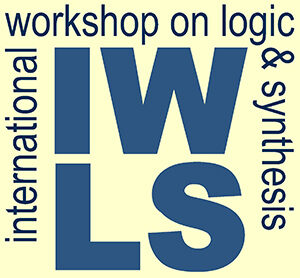The time zone for each day is as follows:
- Day 1: Monday, July 27 in Pacific Time (PT)
- Day 2: Wednesday, July 29 in Japan Standard Time (JST)
- Day 3: Thursday, July 30 in Central European Summer Time (CEST)
| PT | JST | CEST | |
|---|---|---|---|
| Day 1 | Monday, July 27, 8:50am to 2:45pm | Tuesday, July 28, 0:50am to 6:45am | Monday, July 27 5:50pm to 11:45pm |
| Day 2 | Tuesday, July 28, 5pm to 10:25pm | Wednesday, July 29, 9am to 2:25pm | Wednesday, July 29, 2am to 7:25am |
| Day 3 | Thursday, July 30, 0am to 4:25am | Thursday, July 30, 4pm to 8:25pm | Thursday, July 30, 9am to 1:25pm |
- Monday 27 Jul 2020
- Wednesday 29 Jul 2020
- Thursday 30 Jul 2020
Monday 27 Jul 2020
8:50 am - 9:00 am Opening
General/Program Chairs: Pierre-Emmanuel Gaillardon, Heinz Riener, Luca Amaru
9:00 am - 10:00 am Keynote 1: Accelerator Synthesis for Agile Hardware Specialization: A New Dawn
Moderator: Heinz Riener
Speaker: Zhiru Zhang
Session page: https://iwls20.cade.utah.edu/keynote-1-internal/
10:00 am - 10:30 am Break
break 1
10:30 am - 11:45 am Session 1: To SAT solve, or not to SAT solve
Moderator: Vinicius Callegaro
Session page: https://iwls20.cade.utah.edu/session-1-internal/
Determining the Multiplicative Complexity of Boolean Functions using SAT
Mathias Soeken
SAT-based Exact Physical Design for Field-coupled Nanocomputing Technologies
Marcel Walter
Simulation-Guided Boolean Resubstitution
Siang-Yun Lee
11:45 am - 12:15 pm Break
break
12:15 pm - 1:15 pm Programming Contest Session
Moderator: Gai Liu
Speakers: Alan Mishchenko, Sat Chatterjee, and Gai Liu
Session page: https://iwls20.cade.utah.edu/programming-contest-session-internal/
1:15 pm - 1:30 pm Break
break 2
1:30 pm - 2:45 pm Special Session: The Challenges of Automating the Design Flow of Superconducting Electronic Circuits
Moderator: Tsung-Yi Ho
Session page: https://iwls20.cade.utah.edu/special-session-1-internal/
Wednesday 29 Jul 2020
9:00 am - 10:00 am Keynote 2: Recent Topics and Future Perspectives on BDD/ZDD-Based Discrete Structure Manipulation
Moderator: Luca Amaru
Speaker: Shin-ichi Minato
Session page: https://iwls20.cade.utah.edu/keynote-2-internal/
10:00 am - 10:30 am Break
Break 2-1
10:30 am - 11:45 am Session 2: Approximate synthesis and fault equivalence identification
Moderator: Jie-Hong Roland Jiang
Session page: https://iwls20.cade.utah.edu/session-2-internal/
A Low-Cost FSM-based Bit-Stream Generator for Low-Discrepancy Stochastic Computing
Sina Asadi
Exploring Target Function Approximation for Stochastic Circuit Minimization
Chen Wang
SAT-Based Sequential Fault Equivalence Identification in Functional Safety Verification
Ai Quoc Dao
11:45 am - 12:15 pm Break
Break
12:15 pm - 1:30 pm Session 3: Optimize your functions: new heuristic and exact methods
Moderator: Alan Mishchenko
Session page: https://iwls20.cade.utah.edu/session-3-internal/
Auto-tuning framework for BDD packages
Yukio Miyasaka
Practical Multi-armed Bandits in Boolean Optimization
Cunxi Yu
Reduction Methods of Variables for Large-Scale Classification Functions
Tsutomu Sasao
1:30 pm - 1:45 pm Break
Break 2-2
1:45 pm - 2:25 pm Session 4: Compress and secure your data: Synthesis can help
Moderator: Zhufei Chu
Session page: https://iwls20.cade.utah.edu/session-4-internal/
Design Optimization for Faster Fp256 Elliptic Curve Cryptography
Kento Ikeda
Lossless compression via two-level logic minimization: a case study using Chess endgame data
Dave Gomboc
Thursday 30 Jul 2020
9:00 am - 10:00 am Keynote 3: Logic Synthesis for optimizing the performance of SW-based Homomorphic calculations
Keynote 3: Olivier Heron, CEA List
Chair: Pierre-Emmanuel Gaillardon
Session page: https://iwls20.cade.utah.edu/keynote-3/
10:00 am - 10:30 am Break
Break 3-1
10:30 am - 11:45 am Session 5: XORs are fun!
Moderator: Petr Fišer
Session page: https://iwls20.cade.utah.edu/session-5-internal/
Symbolic Uniform Sampling with XOR Circuits
Yen-Ting Lin
Three-Input Gates for Logic Synthesis
Dewmini Sudara Marakkalage
XMG-based Logic Synthesis for Emerging Reconfigurable Nanotechnologies
Shubham Rai
11:45 am - 11:55 am Updates on the EPFL logic synthesis and ECO benchmarks
Moderator: Giulia Meuli
Session page: https://iwls20.cade.utah.edu/updates-on-the-epfl-logic-synthesis-and-eco-benchmarks-internal/
11:55 am - 12:25 pm Break
Break 3-2
12:25 pm - 1:15 pm Session 6: Predict and design your critical paths
Moderator: Mathias Soeken
Session page: https://iwls20.cade.utah.edu/session-6-internal/
EaSyOpt: Predicting Post Place and Route Critical Paths for Early Synthesis Optimization
Walter Lau
Variation-Tolerant Voltage Over-Scalable Design with Critical Path Isolation and Bit-Width Scaling
Yutaka Masuda
1:15 pm - 1:25 pm Closing
Chair: Pierre-Emmanuel Gaillardon
